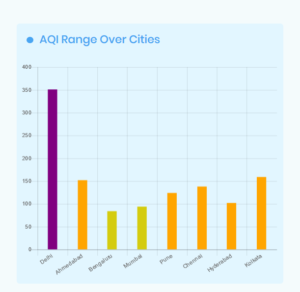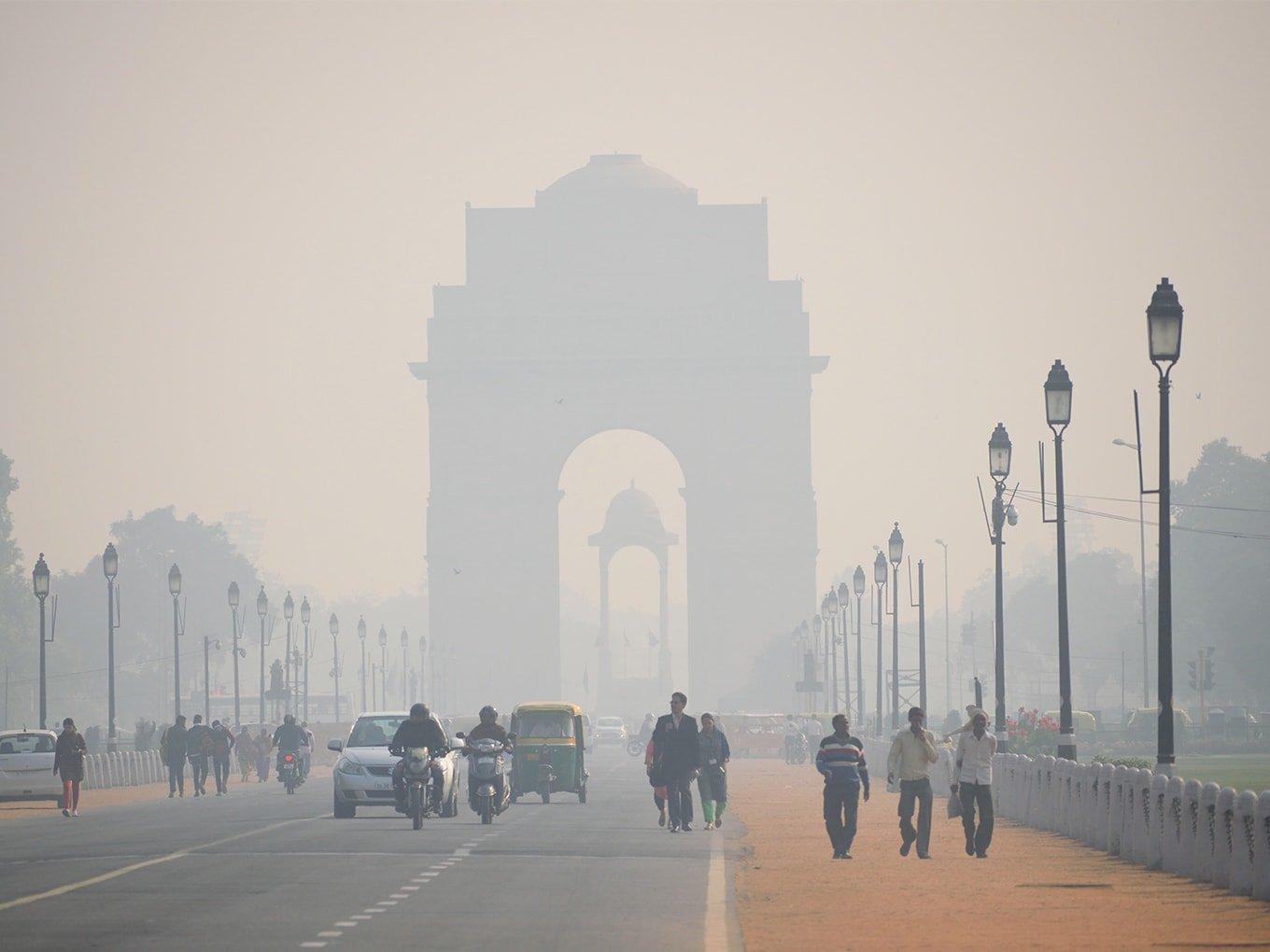With post-Diwali pollution and crop stubble burning, air quality in Delhi has reached hazardous levels
Besides electric vehicles, tech startups are offering innovative solutions to the major pollution factors
Can India leverage tech to solve one of its biggest urban health threats in recent times?
A decade or so ago, the days following Diwali brought a rejuvenated mind, gratitude, more sweets and memories to cherish. Cut to today, the only thing or the first thing you read or talk about the day after Diwali is about air pollution in cities and the deteriorating air quality which ranges from ‘very poor’ to ‘hazardous’ to ‘severe’. Each year it’s a repeat of the same news, social media posts and tweets, but things don’t seem to be changing too much, as the problem of pollution in the cities gets compounded due to festivities, increased vehicular pollution and the seasonal crop stubble burning that harms northern parts of India.
As of Monday, October 28, AQI in Delhi hit 351 or ‘Severe’ with PM 2.5 particulates being the primary pollutant. Among the most polluted cities of India, Delhi’s air quality was more than twice as bad as the next most polluted city of Kolkata, as seen in this graph:

While crackers and stubble burning may be the reason for the air quality in Delhi reaching hazardous levels post Diwali, the air pollution across cities all through the year is estimated to kill 1.5 Mn people every year and is the fifth largest killer in India.
Well, however, there is still some hope for a better future in terms of effort from a lot of tech startups, NGOs, green warriors, entrepreneurs and engineers who are looking at ingenious ways to curb pollution all through the year. While a long way to go, thanks to them the awareness has come in and there is some hope for a cleaner future.
Cleantech and Agritech Startups Tackling Air Pollution Post Diwali
According to a report by the centre for science and environment (CSE) in June this year, life expectancy in India has gone down by 2.6 years due to the deadly diseases caused by air pollution, which usually gets much worse around the Diwali season due to weather patterns and farming practices.
While it’s time the government put in place stricter policies, innovative ideas from across the country is also the need of the hour. The pollution reduction industry also throws in a $15 Tn opportunity, making it all the more possible for cleantech startups such as AirOK, Ambee, Air-Ink and others use technology to ensure intergenerational equity. From monitoring air quality to solving the stubble burning issue, these startups are hopeful about some positive change soon.
Making Ink Through Soot
One of the most innovative solutions in recent times is the Air-Ink produced by Graviky Labs, which has earned a lot of renown in the past few years. The company captures air pollution and recycles it into inks. Soot, an important ingredient in ink, use to make it black, is also found in air-pollution emissions. Thus, Graviky has developed an ink, called Air-Ink, made from air pollution, in which soot is a major ingredient. Air-Ink repurposes pollution and turns it into tools for art. The process upcycles carbon from air-pollution emissions and enables carbon-negative printing and production.
AIR-INK is the first ink made entirely out of air pollution. After capturing air-pollution through pilot trials, the company, founded by Anirudh Sharma and Nikhil Kaushik in 2013, repurposes carbon-rich pollutants into tools for art. The soot trap, called Kaalink, is fit over the exhaust pipes of major emitters like cars and diesel generators with each one collecting up to 95% of the pollutants emitted from the tailpipe, including particulates between 2.5 and 10 micrometres in diameter. One Kaalink can collect enough carbon to produce enough liquid to fill a pen in 45 minutes.
Tech Solving Stubble Burning In Indian Farms
One of the main reasons for sudden shoot up of pollution levels during winter is the stubble burning which is practiced in Punjab and Haryana. Besides the Diwali firecrackers and the vehicular pollution, crop burning pumps smoke into the air and the weather patterns around this time of the year worsen the air quality quite a bit. While the government has been negotiating with the farmers to resolve the issues and limit pollution due to crop stubble burning, A2P (Agri2Power) Energy Solution is a startup working at the ground level.
Founded in March 2018 by Sukhmeet Singh, A2P Energy buys crop residue from farmers and converts this waste to useful products. It processes the straw to develop pellets that could be an alternative to coal and wood, according to a report in The Better India. This process ensures more income for the farmers and encourages them to not burn straw and rather sell it for production of high-value products for the energy industry. The startup has till date supplied pellets to clients in food processing, pharmaceutical and dyeing industries including Pepsico and Hindustan Unilever.
There are also more innovative solutions market which startups could tap into soon. For example, the global synthesis gas (syngas) body recommends a process called gasification, which converts any material containing carbon, such as coal, petroleum coke, biomass or waste, into synthesis gas. This can be used to manufacture chemicals, fertilisers, liquid fuels, substitute natural gas (SNG) or hydrogen. Gasification is said to help reduce a country’s dependence on imported oil and natural gas, which are areas that India is also looking to improve. It can also provide a clean alternative source of baseload electricity, fertilisers, fuels and chemicals, according to the Global Syngas Technologies Council.
Satellite Data Solving On-Ground Issues
A2P Energy Solution uses Google Maps API to extract the images of paddy fields which are close to the harvesting season and thus gets in touch with farmers before they start burning. They also use NASA satellite data to point out the areas which are burning stubble and contributing to air pollution.
Besides startups working on the ground, some other tech startups are leveraging satellite data and imagery to aggregate data about pollution and bring in analytics for real-time information on key environmental indicators. Ambee, is one such environment intelligence startup which has launched a website that provides hyperlocal air quality data in near real-time. The website provides a quick overview of real-time air quality information from more than 15K monitoring stations from more than 65 countries, covering 150K locations.
Can Electric Mobility Bring In The Change?
The World Economic Forum (WEF) recently released a report stating that India has the potential to become the largest electric vehicles (EV) market in the world. Christoph Wolff, head of mobility, WEF said, “The role of government is crucial for accelerating adoption. Right now, the uptake of electric vehicles is slow due to the high upfront cost and range anxiety, but a long-term investment in research and development (R&D) will create sustained growth.
Recently, Tata Motors joined the EV market with its subsidiary Jaguar Land Rover (JLR) and announced plans to roll out six EVs in India in 2020. Jaguar also wanted to tap in with its first all-electric car, I-PACE series, expected to be launched in the second half of 2020. It’s also expected to launch a Tigor EV hatchback in the country.
However, many companies, including BMW, Toyota and Maruti Suzuki, have expressed concern over the launch of EVs in India. The company finds the cost of manufacturing EVs and lack of charging infrastructure as a deterrent to the mass adoption of electric vehicles in the country. Maruti started nationwide EV testing in September last year and plans to launch its first EV in India next year. The company expressed that it would be difficult to make a good value proposition immediately unless the cost comes down substantially.
The need for electric mobility to tackle air pollution has been recognised by various startups that have deployed electric vehicles in their delivery fleets, including food delivery giants such as Zomato and Swiggy, ecommerce major Amazon, furniture company IKEA and hyperlocal delivery startup Grofers and BigBasket. During the festive season consumer rush, many of these delivery companies are processing more orders than ever.
According to a FICCI and Rocky Mountain Institute report titled ‘Enabling India’s Transition to Electric Mobility’, in the passenger vehicle sector, the country’s shift to shared, electric and connected mobility could help save up to $300 Bn (INR 20 Lakh Cr) in oil imports and nearly 1 gigatonne of carbon dioxide emissions by 2030.
The report said that India’s urban population will nearly double in the next decade to approximately 600 Mn in 2030 and forecasts suggest that by then India’s urban population will take almost 500 Mn trips per day. This rapid growth presents major policy and business challenges, with electric mobility seen as a major solution in urban areas. Even as Indians are celebrating Diwali, it must be remembered that pollution is not a problem that can be solved in one year. It requires years of efforts and counterbalances to improve air quality in our cities.
































 Ad-lite browsing experience
Ad-lite browsing experience